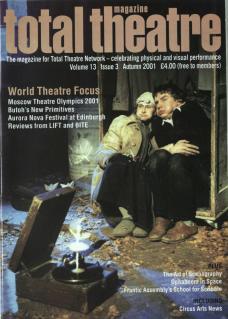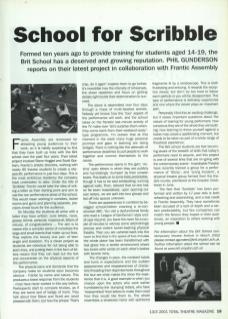Frantic Assembly are renowned for attracting young audiences to their work, so it is hardly surprising to find that they have built up links with the Brit School over the past four years. Their latest project involved Steve Hogget and Scott Graham, Frantic's artistic directors, working with nearly 60 theatre students to create a site-specific performance in just four days. This is the most ambitious residency the company have undertaken to date. Under the title of Scribble, Frantic would take the idea of writing a letter as their starting point and aim to use the non-performance areas of the school. This would mean working in corridors, locker rooms and gyms and planning separate, precision-timed tours for the audience.
On Monday the students all arrive with a letter they have written: love letters, news, gossip, formal, personal, impersonal, letters of refusal, of congratulations... The aim is to weave into a complex series of narratives the large and small events that make up our lives. They explore the beauty and pain of teen angst and boredom. It's a clever project as students are notorious for not being able to learn lines, and putting them in the form of letters means that they can read out the text and concentrate on the physical aspects of the performance.
The physical pace and demands that the company make on students soon becomes obvious – Frantic by name and nature. This produces a brave response from the students – most have never worked in this way before. Participants start to compare bruises, as if they are some sort of badge of merit. They talk about how Steve and Scott are never pleased with them, but how the phrase 'That's crap, do it again' inspires them to go further. It's incredible how the intensity of rehearsals, the sheer repetition and focus on getting details right, builds their determination to succeed.
The piece is assembled over four days through a mass of multi-faceted scenes. Nobody yet knows how the 'tour' aspect of the performance will work, and the school takes on the frenetic last-minute activity of the TV make-over 'let's-surprise-them-when-they-come-back-from-their-weekend-away’ type programme. I'm certain that at this moment in the week many huge personal journeys and gaps in learning are being bridged. There is nothing like the adrenalin of performance deadlines to pull people to work together and commit themselves to the cause.
The performance opens in the gym; 'Victims' open letters in which they are publicly and humiliatingly 'dumped' by their unseen lovers. This leads on to some fairly predictable, though it has to be said exhilarating, running against walls. Then, relieved that no one has so far been hospitalised, upon opening our own letters, we are split into tour groups and led off into spaces unknown.
There are appearances in corridors by bewigged schoolchildren chanting a reconstructed ABC. You visit a dysfunctional family who read a 'League of Gentlemen'-style end-of-year résumé: you leave the room for a couple of minutes to witness some astonishingly precise and violent locker-bashing physical theatre. Then you are ushered back into the room to find that in the space of two minutes the whole place has been transformed with real grass into a tender environment where two lovers write words on each other's bodies with laconic irony.
The changes in pace, the constant twists and turns in expectations and the sudden appearances and reappearances of characters threading their disjointed texts throughout the tour are what makes the show the experience that it is. A good example is when you chance upon the actors who were earlier humiliated by the 'dumping’ letters, who have 'reassembled’ their letters to make them read how they would like them to. The whole resembles a shattered mirror with splintered fragments lit by a stroboscope. This is both frustrating and enticing. It rewards the receptive viewer, but don't try too hard to follow each particle or you will be disappointed. This type of performance is definitely experiential and one where the viewer plays an important part.
Personally I find this an exciting challenge, but it raises important questions about the nature of training for young performers: how conscious they are of the whole they are building; how learning to throw yourself against a locker may create a spellbinding moment, but needs to be taken as part of a whole range of theatrical experience.
The Brit School students are fast becoming aware of the breadth of skills that today's performers need to acquire, and this project is one of several links that are ongoing with the contemporary scene – Improbable Theatre have recently trained a group for a performance of Sticky, and Living Incident, a physical theatre group formed from the theatre course, premiered at the Croydon Clocktower in June.
The fact that Scribble has been performed and written by seventeen year-olds is both refreshing and astonishing, and a real credit to Frantic Assembly. They have sometimes been accused of a lack of depth and a certain predictability, but few companies can match the fervour they inspire in their audiences, an inspiration to others working with young people.
For information about the Brit School contemporary theatre festival in March 2002 please contact pgunders@brit.croydon.sch.uk. Further information about the school can be found at www.brit.croydon.sch.uk

